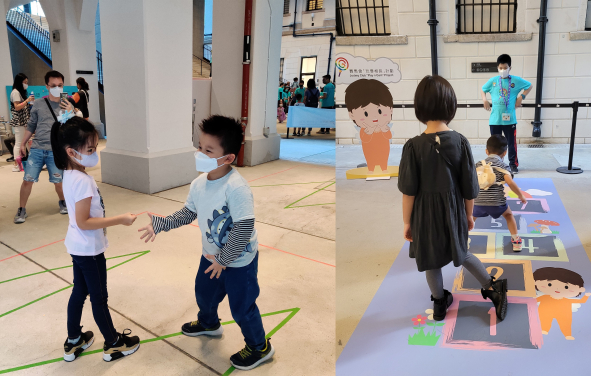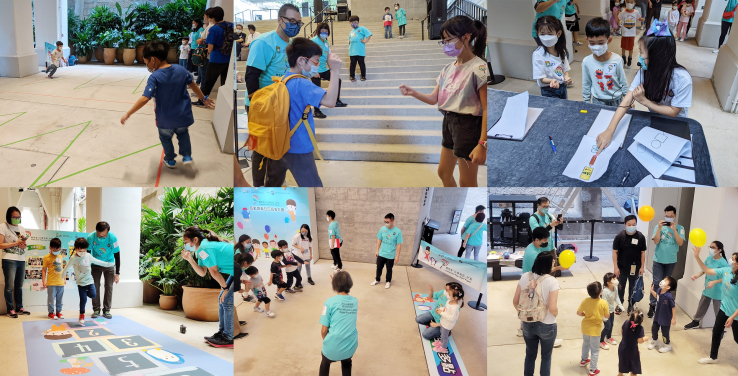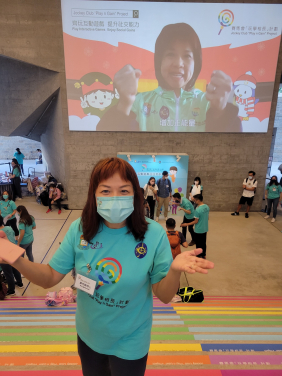Media
Faculty of Education, the University of Hong Kong
Jockey Club “Play n Gain Project”
Day Day Play at Tai Kwun
23 Nov 2021

Both the children who led and participated in the game had a great time and acquired the skills of communication and collaboration from playing.

A group of enthusiastic volunteers and trained Game Ambassadors, practised play skills again. They included volunteers from the Agency for Volunteer Service, parents of primary school and kindergarten students, Junior Game Ambassadors, community class graduate and senior Game Ambassadors, non-Chinese speaking students and their Chinese tutors.

Dr Sylvia Liu, Project Director of the Jockey Club “Play n Gain” Project, Centre for Advancement in Inclusive and Special Education, Faculty of Education, The University of Hong Kong cheered up the Game Ambassadors and volunteers, and encouraged them to continue to play and practise more, so as to bring interactive play experience to family groups and the community.

Both the children who led and participated in the game had a great time and acquired the skills of communication and collaboration from playing.

A group of enthusiastic volunteers and trained Game Ambassadors, practised play skills again. They included volunteers from the Agency for Volunteer Service, parents of primary school and kindergarten students, Junior Game Ambassadors, community class graduate and senior Game Ambassadors, non-Chinese speaking students and their Chinese tutors.
- 1 / 3
- 2 / 3
- 3 / 3
The Jockey Club “Play n Gain Project” (the Project) successfully organised a parent-child event called “Day Day Play at Tai Kwun” on November 20, 2021 (Saturday). This project is implemented by the Centre for Advancement in Inclusive and Special Education (CAISE) at the Faculty of Education, the University of Hong Kong (HKU), and funded by The Hong Kong Jockey Club Charities Trust. The event aimed to spread positive energy from kindergarten to community through play education.
Dr Mantak Yuen, the Principal Investigator of the Project remarked: “As the COVID-19 pandemic begins to ease, we have planned to organise some interactive play activities in the community under proper social distancing. The event in Tai Kwun successfully enabled participants to understand that playing games could turn learning into fun, did not require props, and could be played anytime, anywhere, with anyone. Parents modified traditional games to make them more playful and interactive.”
Dr Sylvia Liu, Director of the Project added: “Through these parent-child activities, we spread the value of play education from kindergarten to the community, breaking through generational and geographical boundaries. Regardless of age and background, adults and children could together learn key interactive game skills that will benefit their social and emotional development. In this event, parents who had already acquired the game skills (the ‘game ambassadors’) invited participants to play well-known games enhanced with new elements. We also had a ‘My Favourite Game Award’ to encourage them to think of innovative ideas for game development.”
It had been over three years since the Project was launched, and the team had witnessed real growth in participating parents who joined in the training workshops and learnt how to lead games in the kindergarten where their children are studying. They had also assisted in organising on-site play days at HKU; and during the pandemic they had even learnt to lead interactive games online. In this event at Tai Kwun, these parents helped further promote play education to the community.
Looking forward, the Project will continue to cooperate with partner organisations and expand the community network. The Project team’s wish is to involve more elders, parent volunteers, non-Chinese speaking students, and people from all walks of life to participate in and lead interactive games. Parents benefit from returning to games of their childhood, being filled with positive energy and communicating better with children through playing the games. Children benefit by enhancing their interpersonal and social skills through playing interactively with new friends.
About the Jockey Club “Play n Gain Project”
Jockey Club “Play n Gain Project” is a play education programme funded by The Hong Kong Jockey Club Charities Trust and implemented by CAISE in the Faculty of Education at HKU. The project was developed from a research-based play education programme used effectively in Hong Kong for over 10 years. The conceptual framework underpinning the project is the “Social Star Mirror Model” created by Dr Liu in 2015 to improve children’s social-emotional learning through playing face-to-face interactive games. Fourteen kindergartens have adopted this approach in which parents join forces with teachers to create positive social learning experiences for children. The parents ultimately become skilled and knowledgeable in applying games as a positive aid to increasing children’s social and emotional development, and they are able to apply the skills at home and in community settings.
To learn more about the Project and the upcoming game education activities and community class, please visit www.jcplayngain.edu.hku.hk and the Facebook page.
For media enquiries, please contact Ms Virginia Cheung of Jockey Club “Play n Gain Project” (Tel: 3917 5828 / Email: jcplayngain@hku.hk), or Ms Emily Cheung, Senior Manager (Development and Communications), Faculty of Education, HKU (Tel: 3917 4270 / Email: emchy@hku.hk).
